 Petzlover
Petzlover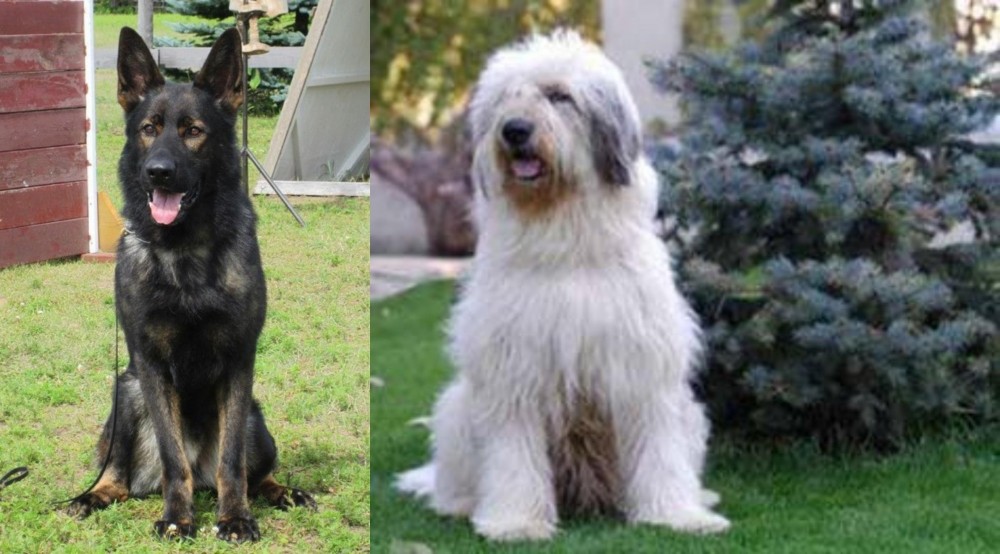 East German Shepherd is originated from Germany but Mioritic Sheepdog is originated from Romania. East German Shepherd may grow 10 cm / 3 inches shorter than Mioritic Sheepdog. East German Shepherd may weigh 20 kg / 44 pounds lesser than Mioritic Sheepdog. Both East German Shepherd and Mioritic Sheepdog has almost same life span. Both East German Shepherd and Mioritic Sheepdog has same litter size. East German Shepherd requires High Maintenance. But Mioritic Sheepdog requires Moderate Maintenance
East German Shepherd is originated from Germany but Mioritic Sheepdog is originated from Romania. East German Shepherd may grow 10 cm / 3 inches shorter than Mioritic Sheepdog. East German Shepherd may weigh 20 kg / 44 pounds lesser than Mioritic Sheepdog. Both East German Shepherd and Mioritic Sheepdog has almost same life span. Both East German Shepherd and Mioritic Sheepdog has same litter size. East German Shepherd requires High Maintenance. But Mioritic Sheepdog requires Moderate Maintenance
 The East German Shepherd is a line of the German Shepherd Dog breed. The German Shepherd Dog came about when the three types of “continental shepherd dogs” separated into the Dutch Shephers, German Shepherd and Belgian Shepherd. In the 1800’s it was local shepherds who bred their dogs and selected the traits they needed in their geography. The result was dogs in various local areas who all could herd and guard flocks; who were intelligent, strong, fast and had a good sense of smell, but their appearance and skills varied from town to town.
The changes in Germany from agriculture and sheep to industrial cities rendered the German Sheep Dog obsolete. But was it really? Many felt the dog could be a good working dog in the cities as well but needed some refinement in the breed according to Max von Stephanite. At a dog show in 1899, he found what he wanted – the perfect working dog.Stephanitz bought the dog and founded the Society for the German Shepherd. (Verein fur Deutsch Schaferhunde) Stephanitz is considered the developer of the German Shepherd Dog.
The East German Shepherd is a line of the German Shepherd Dog breed. The German Shepherd Dog came about when the three types of “continental shepherd dogs” separated into the Dutch Shephers, German Shepherd and Belgian Shepherd. In the 1800’s it was local shepherds who bred their dogs and selected the traits they needed in their geography. The result was dogs in various local areas who all could herd and guard flocks; who were intelligent, strong, fast and had a good sense of smell, but their appearance and skills varied from town to town.
The changes in Germany from agriculture and sheep to industrial cities rendered the German Sheep Dog obsolete. But was it really? Many felt the dog could be a good working dog in the cities as well but needed some refinement in the breed according to Max von Stephanite. At a dog show in 1899, he found what he wanted – the perfect working dog.Stephanitz bought the dog and founded the Society for the German Shepherd. (Verein fur Deutsch Schaferhunde) Stephanitz is considered the developer of the German Shepherd Dog.
The East German Shepherd is a line of the same breed. There are several different lines of the German Shepherd Dog, with slight difference for the reason they were bred. For instance, the German Shepherd Dog is bred for looks while the East German Shepherd is bred to be a working dog. Often called a DDR German Shepherd, they came about from the Deutsche Democratic Republic or the Republic of East Germany. For about 40 years in East Germany these dogs were bred only within the DDR bloodline.
The East German Shepherd is stronger, heavier boned, leaner, more muscular and solid. During the time of the Berlin Wall, from 1961-1989, there were few German Shepherds for breeding stock on either side of the wall, but especially in the East. There the government controlled the development of the breed. They developed a separate registry for the DDR – East German Shepherd. With such strict standards for a perfect working dog and such little breeding stock, the only dogs allowed to reproduce were the ones that passed a rigorous test and were deemed perfect working dogs.
In West Germany they continued to breed for appearance. The West German Shepherd are the most popular ones and are usually simply called German Shepherds. The show dogs of today and the American line came from the West.
Preserving the East German Shepherd today is important and difficult. It means preserving not improving. The Strength of the East German Shepherd is their body line and style, Today’s breeder must maintain this while making sure there is enough diversity in the gene pool to keep the line healthy without losing its body style and working temperament. It is important that the East German Shepherd have a straight back rather than the sloping one of the German Shepherd Dog or the American lines of the GSD. The working dog is also more aggressive and has a much higher work drive than any of the other German Shepherd Dogs lines.
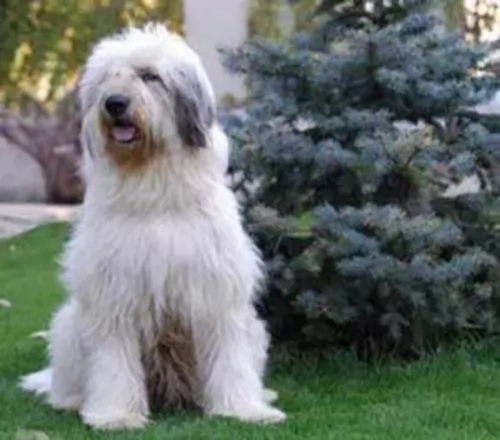 This is a large dog coming from the Carpathian mountain area of Romania.
This is a large dog coming from the Carpathian mountain area of Romania.
He has always been an excellent working dog, guarding and protecting sheep. Farmers always kept these dogs as working dogs, with no written records being kept about the development of the breed.
The breed is ancient, possibly dating back to ancient Roman times. It was in the 20th century that interest in the breed was ignited, and in 1981 the first official breed standard was recorded. The breed was also registered with the Federation Cynologique Internationale in 2005.
 What are the differences between the German Shepherd Dog (GSD) and the East German Shepherd? The East German Shepherd has a straight back and a larger bone structure. He has a very large and block shaped head with a lean, athletic build. His lips are taunt and dark, and his nose must be black. He has a scissor bite and strong teeth. His eyes are medium sized almonds that are slanted slightly. The eyes are also very dark. His ears are erect and not too big. His legs, haunches and feet must all be coordinated so that he trots rather than runs.
What are the differences between the German Shepherd Dog (GSD) and the East German Shepherd? The East German Shepherd has a straight back and a larger bone structure. He has a very large and block shaped head with a lean, athletic build. His lips are taunt and dark, and his nose must be black. He has a scissor bite and strong teeth. His eyes are medium sized almonds that are slanted slightly. The eyes are also very dark. His ears are erect and not too big. His legs, haunches and feet must all be coordinated so that he trots rather than runs.
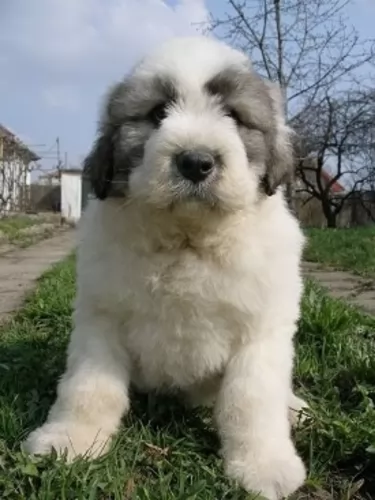 The Mioritic Sheepdog looks very much like the Old English Sheepdog with his huge body covered with long hair.
The Mioritic Sheepdog looks very much like the Old English Sheepdog with his huge body covered with long hair.
His head is also large with a black nose and smallish to medium length floppy ears. The color of the double coat is usually white, cream or pale gray, and sometimes you will find patches of these colors.
The tail has always been traditionally docked, otherwise the tail is left long with a slight curl at the end. The height of the dog is 65 to 75cm and he weighs roughly 50–60kg. Below the thick coat is a muscular dog with strong, straight legs which can help him become quite agile and speedy when needed. Allowed to breed, they can produce anything from 3 to 9 of the most adorable looking puppies.
The Mioritic Sheepdog is a balanced dog, loving to be with his owners but being wary of strangers. He is a brave dog, willing to guard his human family with his life.
He is also a strong-willed and dominant so it will be to his benefit to be trained and socialized so that he becomes obedient and easy to have around.Training won’t be difficult as he is an intelligent breed and already naturally obedient.
He is an energetic dog too so he will need to have regular exercise and games. He therefore gets on well with children in the home, loving to join in with all their games. He will need to be supervised around small children just because of his cumbersome, large size.
 The East German Shepherd is a well- balanced dog. He is sure of himself, friendly, loyal and wants to please his owner. He is intelligent, resilient and attentive. He will make a great family pet. He is aggressive with a high prey drive but that can be tempered with good socialization and training. He is easy to train.
The East German Shepherd is a well- balanced dog. He is sure of himself, friendly, loyal and wants to please his owner. He is intelligent, resilient and attentive. He will make a great family pet. He is aggressive with a high prey drive but that can be tempered with good socialization and training. He is easy to train.
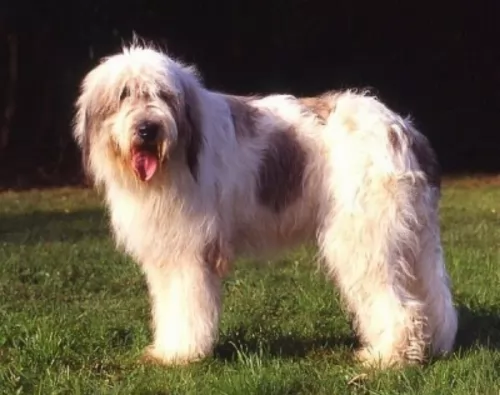 The Mioritic Shepherd has always been used to guard and protect livestock, but even though he has always taken this role seriously, he is calm and loving around his human family, making a splendid family pet.
The Mioritic Shepherd has always been used to guard and protect livestock, but even though he has always taken this role seriously, he is calm and loving around his human family, making a splendid family pet.
He also plays the role of guardian and protector of his human family seriously. He is a big strong dog and training and socialization will become necessary as he can become aggressive with certain people who he doesn’t trust.
Inviting one of these dogs into your home will ensure having a constant and loving companion at your side.
 Because the East German Shepherd line has been isolated behind the Berlin Wall, there are not many genetic health issues in the line. Most importantly the East German Shepherd shows no hip dysplasia which plagues most GSD. There are a couple of situations to look out for. They are:
Because the East German Shepherd line has been isolated behind the Berlin Wall, there are not many genetic health issues in the line. Most importantly the East German Shepherd shows no hip dysplasia which plagues most GSD. There are a couple of situations to look out for. They are:
A life threatening issue that must be addressed immediately for fear of death. Bloat is caused when a larger dog with a deep chest eats too large a meal before or after strenuous exercise, eats too fast, or drinks too much water. The stomach distends with air or gas and twists. Sometimes it is completely inverted. Get help fast or your dog will die.
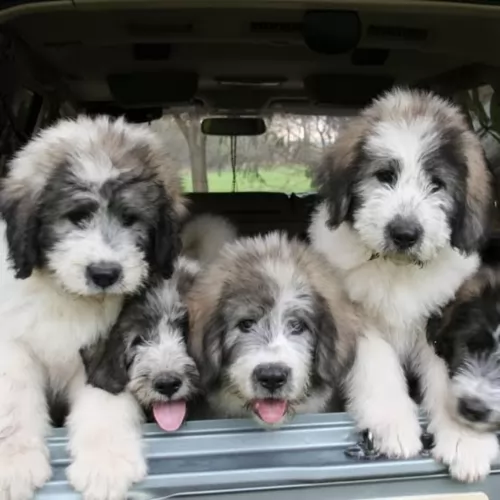 The Romanian Mioritic Shepherd Dog is a truly hardy dog breed and with good care such as good food and exercise can reach 14 years of age.
The Romanian Mioritic Shepherd Dog is a truly hardy dog breed and with good care such as good food and exercise can reach 14 years of age.
There are always some common dog illnesses to look out for and because he is a large dog, hip dysplasia can be a problem.
This is a disease where there is abnormal growth of the hip joints. Smooth movement of the joint is hindered and this leads to inflammation and pain.
At first you may find your dog limping and then you may find that after lying down, he battles to get up again. The joint becomes thickened with less mobility and the dog is reluctant to play like he used to. He will certainly need to get to the vet for treatments to make him more comfortable.
 Because these dogs were bred to work you need to feed them a high quality dry food, made for working dogs. It needs to have a good amount of calcium and glucosamine. Feed about 3-4 cups per day divided into 2 feeding times.
Because these dogs were bred to work you need to feed them a high quality dry food, made for working dogs. It needs to have a good amount of calcium and glucosamine. Feed about 3-4 cups per day divided into 2 feeding times.
In addition to bloat as mentioned above, the East German Shepherd can also have both air born, and food born allergies. These are easily treated by your veterinarian.
The East German Shepherd is a high energy, high activity dog so you have some for him. He is agile and athletic. He needs serious exercise and a job is essential. If you can’t give an East German Shepherd a job, then don’t get this dog. He loves tracking and has a high prey drive. Keep him trained, challenged and working. Try tracking and herding trials, obedience, agility, fly ball and bar hunt.
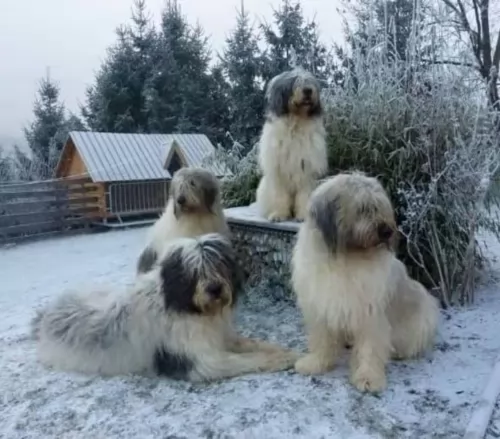 The Mioritic Sheepdog’s long hair is coarse and will need to be regularly brushed to keep it free of tangles. It will certainly need to be brushed 2 or 3 times a week, while some owners of this dog will prefer to have the coat professionally clipped. Because of the long hair, while brushing him it is an excellent time to check for ticks and fleas.
The Mioritic Sheepdog’s long hair is coarse and will need to be regularly brushed to keep it free of tangles. It will certainly need to be brushed 2 or 3 times a week, while some owners of this dog will prefer to have the coat professionally clipped. Because of the long hair, while brushing him it is an excellent time to check for ticks and fleas.
The food you give your pet plays such a critical role in his health and longevity. Always make sure that you’re giving your pet an uncomplicated diet to avoid stomach upsets.
Give him the best commercially manufactured kibble. To provide him with some variety, add in some boiled chicken, cooked vegetables such as potato, carrots and spinach to his kibble from time to time. He will also benefit greatly from having some raw meat added into the kibble occasionally.
Learn to know which human foods are totally toxic to him and avoid these. Make sure he is never without cool, fresh water.